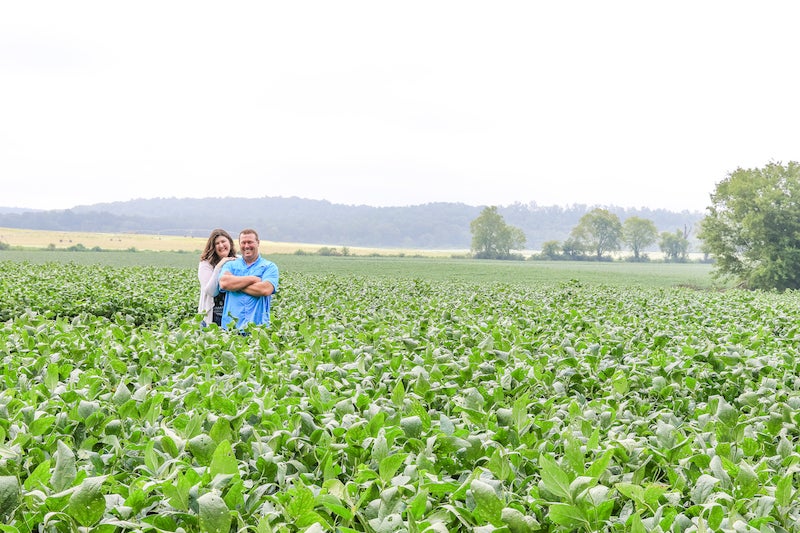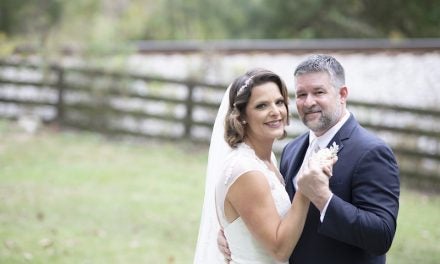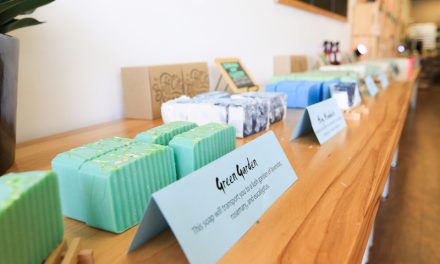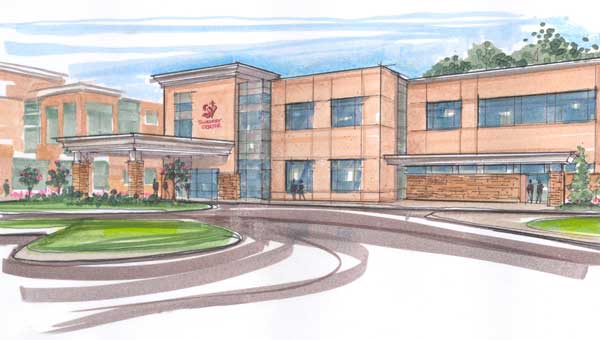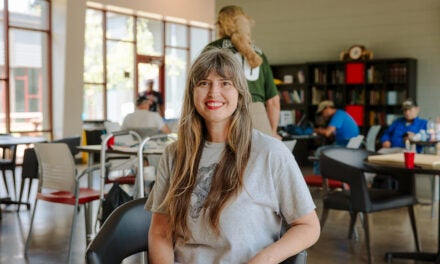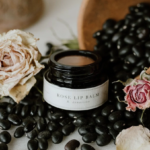Named this year’s Farm of Distinction, DeLoach Farms is the picture of a rich past meeting a promising future.
Lush, healthy green fields of soybeans and corn typify today at DeLoach Farms, but this land also nourishes a unique combination of Alabama agriculture’s history and its future.
The Vincent farm can look back at a family’s stewardship that stretches to the dawn of Alabama statehood. It was founded by John Martin Sr., John DeLoach’s direct ancestor, in 1820.
John, his wife, Kate, and their son, Jess, are all justifiably proud of their farm’s heritage.
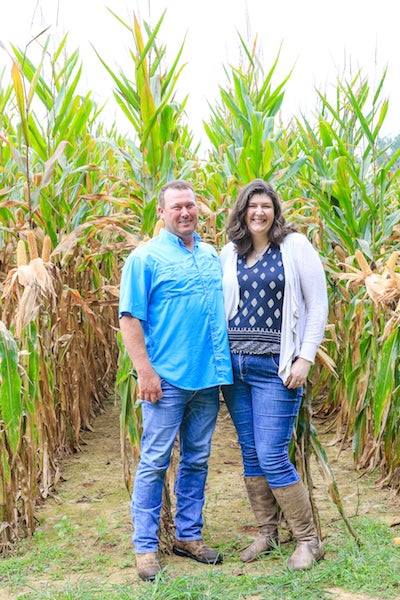
DeLoach was 13 when his grandfather died. His grandmother considered selling out, “but I told her I’d come every day after school to help.” When he graduated from Coosa Valley Academy at 16, he took over running the farm.
The Alabama Farmers Federation’s 2018 Alabama Farm of Distinction, DeLoach Farms competes in October for the title of 2018 Farm of Distinction for the Southeastern United States at a blow-out symposium in Moultrie, Ga.
The droll DeLoach maintains a serious demeanor when he adds: “No, there’s no swimsuit competition.”
“But, if there were one, John would win it,” Kate insists.
Heavy lifting, dawn-to-dusk labor, high up-front equipment investments and the relentless worry about the weather can make farming a daunting occupational choice. Yet, the DeLoaches add a sense of humor and an ability to take the long view—beyond the next drought or the next trade war.
Past confronts future here — and finds a pleasurable detente.
For example, visit a shady grove that overlooks a sun-drenched hillside. This spot is out-of-sight of the DeLoach’s present home, but it is no more than 100 yards from where the original homestead (“Just Beyond”) once stood.
The cabin—“Just Beyond II”—with its perfect board-and-batten siding and the broad welcoming front porch seems to urge a visitor to sit, breathe deeply of fresh country air and relax.
“We built this cabin entirely of materials from right here on the farm,” John said.
Inside, the walls and floors once were cedar trees on the farm. The tin roof? That came from one of the farm’s old barns.
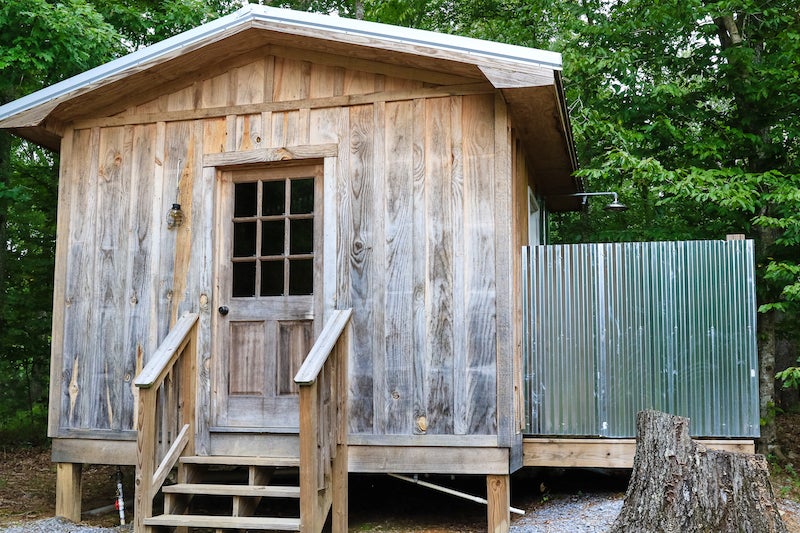
What Kate calls “the world’s fanciest outhouse” stands behind the cabin and is a fully functional bathroom featuring a spa tub and an outdoor shower. The shower’s drain even had a former life—as a sawmill blade.
Let’s go back to that front porch for a moment. The view from its shady depth is a peek into the farm’s future.
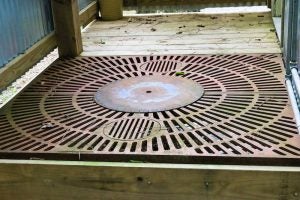
The structure Kate calls “the world’s fanciest outhouse” is a fully functional bathroom featuring a spa tub and an outdoor shower, the drain of which is an old sawmill blade.
“Row crop farming is just about done in Shelby County,” John explains. Factors that led him to that conclusion include the steeply rising land values, the encroaching semi-urban population and uncertainty about short-term prices for DeLoach Farms’ staple crops.
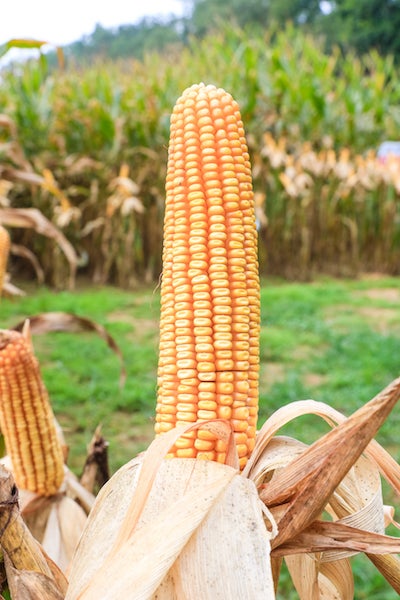
“But people have been drinking wine since the beginning of time,” he said.
So, on that sunny slope sit rows of young canes.
Kate gestures to the carefully flagged and staked rows: “Muscadines, scuppernongs, chardonnay, pino . . .” They have set out 200 plants in all.
“We are going to see which ones grow best here,” she said.
Wine is the next step, the DeLoaches explained, but that first crop of grapes for their first vintage is three years in the future. Then comes a winery. They will wait to see which wines win favor with vinophiles . . . And they expect it to take some time to perfect their wine-making skills.
“We are talking maybe 15 years down the road here,” John cautions.
“We are thinking of an event venue,” Kate said.
Turn around again and look at the perfect cabin, and back toward that sunny rise. Picture those slender canes becoming stout strong main canes stretching their long leafy arms from which hang heavy bunches of succulent grapes. Then look again at that cabin and imagine a radiant bride and a nervous groom, flowers, pastel bridesmaids, the bride’s father with wine glass raised to toast the happy couple with a DeLoach vintage.
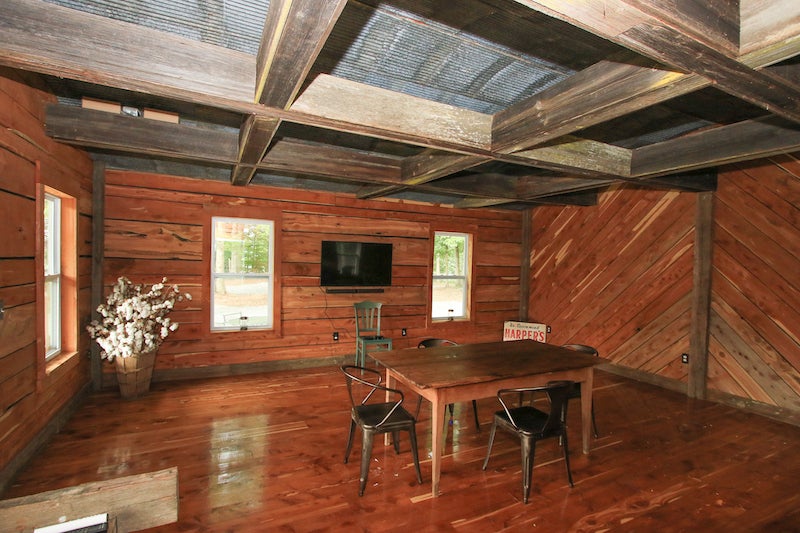
“This is learning by doing,” John explained. “We know we will have some problems along the way. We know we will make some mistakes.”
“Like the robber bees,” Kate added. “We lost our first hive to them.”
Robber bees?
What sounds like a sci-fi movie or a kids’ video game is a real-life horror story.
Bee hives and honey production are another avenue into the farming future.
Bees come in the mail—with the queen in her own private box—and her 10,000 subjects in a three-pound plastic bag. Setting up a hive involves a tray that—as the queen’s empire expands—requires additional trays. However, adding those trays must be timed perfectly, or . . . robber bees.
“We added the second tray too soon,” John said.
“Bees defend their territory,” Kate said, “but we gave them too much to try to protect.”
Thus, the bees were doing what bees do—trying to colonize all their territory.
Unknowingly, the DeLoaches had left the hive vulnerable to attack.
“Robber bees are wild bees that swarm in, kill the domestic bees and steal all the honey,” Kate said.
That was a tough lesson learned the hard way, but the bee hives around the vineyard these days are prospering. Industrious creatures intent on harvesting pollen from Tupelo gums, soybean plants, late summer blooming pickerel rush and drought-tolerant clover will produce 60 to 80 pounds of honey per hive.
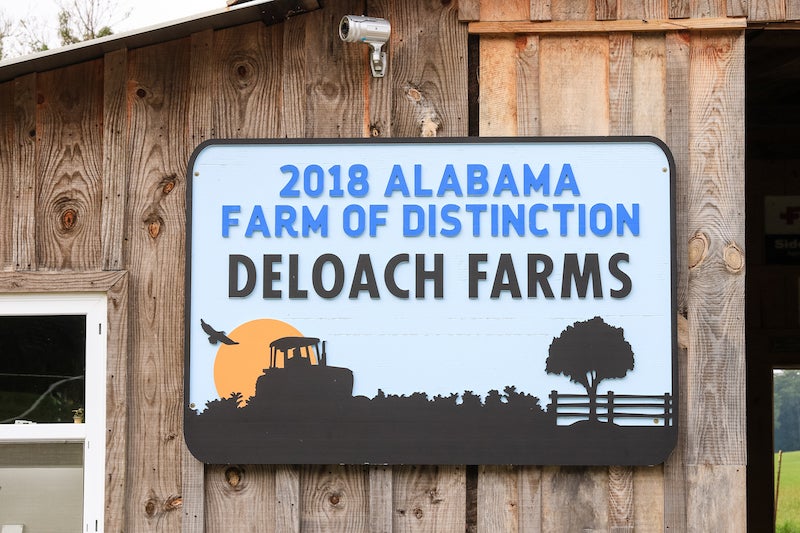
The DeLoaches also work with Auburn University and Pioneer Seed to explore improvement of modern row-crop techniques on the 1,325-acre farm at the same time they explore the future of farming with ventures such as the vineyard and the bee hives.
Meanwhile, Jess DeLoach, a rising senior at Coosa Valley Academy, says he has not yet committed to farming as his life’s work, although he is leaning to Auburn University after high school.
The young man admits that farming has its allure—he loves to hunt waterfowl and deer in the 400 acres of woods and the reclaimed wetlands. “Hunting,” he responds when asked for the best part of growing up on a farm.
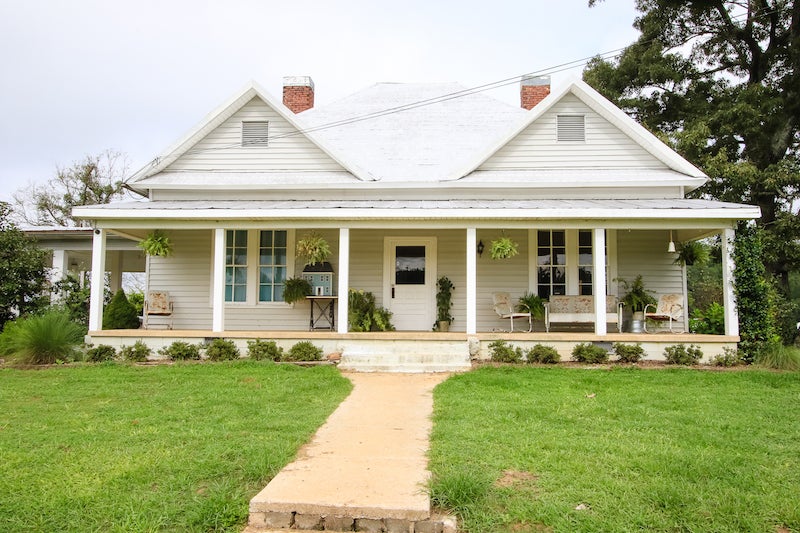
Kate grew up in Atlanta and met John when she was a student at the University of Alabama. She makes it clear that she does not miss the clamor of urban life.
Life on the farm?
She smiles.
“It’s like living at summer camp!”

